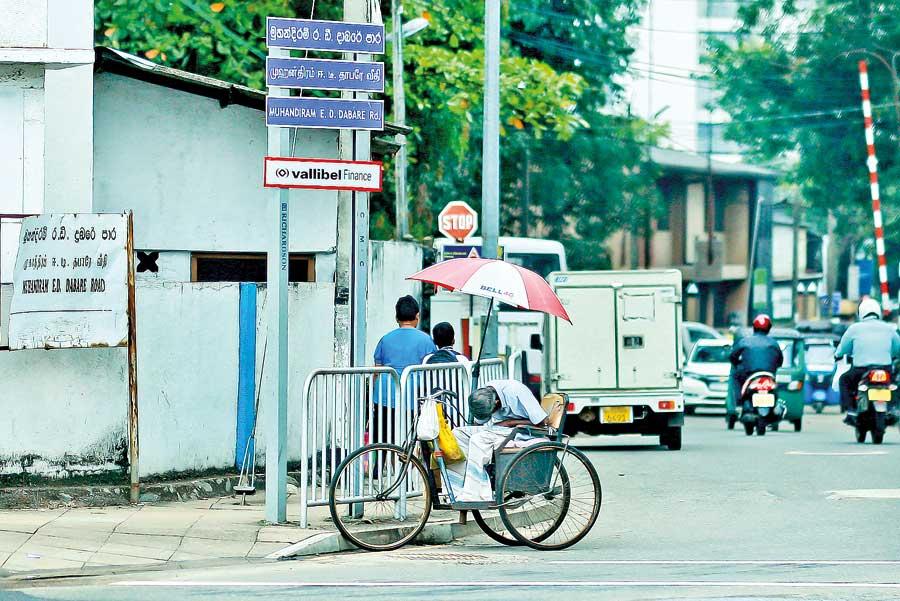Reply To:
Name - Reply Comment
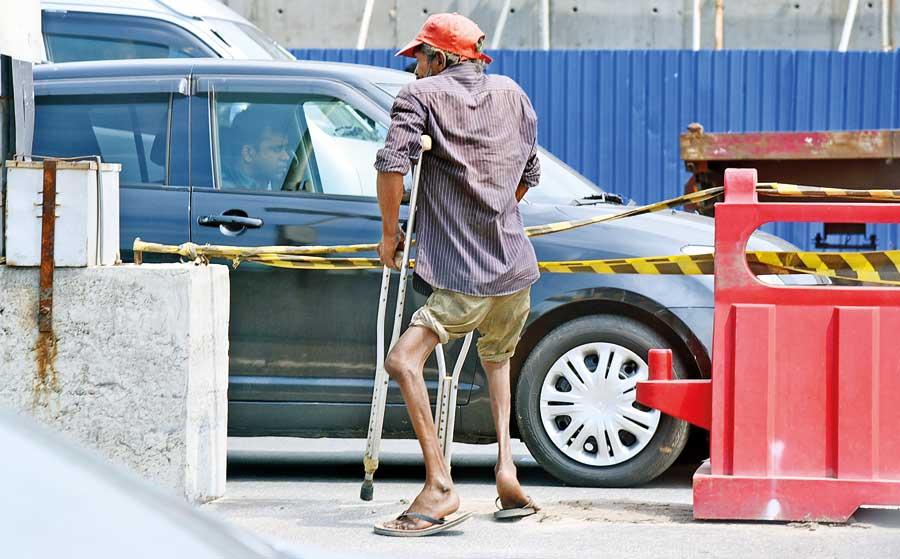
Beggars encounter many barriers when approaching a donor and this picture shows how cruel destiny can be even as thin as this tape which decides whether this less fortunate man gets a few coins
There was a time when they frequented the streets, happy to receive a few coins or a packet of food. Conveniently addressed as beggars, they too are a part of society. 
In fact sociology experts refer to them as depicting the true picture of a particular society. But as cost of living soared there was an influx of beggars - like a pandemic there were more and more of them. It then took the shape of a business and at one point they were not happy with coins or food. They wanted notes! It was then that they became a nuisance – those who gave them a few coins as a meritorious deed turned their backs on them. Begging became a nuisance to the point that on a few occasions they were removed from the streets of Colombo as means of ‘beautifying the city’.
The newly elected Government too seems to be standing firm in its decision to remove beggars and as a first step begging was banned in trains with effect from December 1. Beggars are dropping in numbers and much is spoken about them in social media forums regarding establishing a detention centre for them; all this giving rise to people’s concern for them. With that in mind the Daily Mirror took to the streets to observe any reduction in the numbers while revisiting the Vagrants Ordinance.
Sri Lanka still follows the Vagrants Ordinance that has remained in statute books for 178 long years. Introduced in 1841, the Ordinance was brought about during the British colonial era and hasn’t been amended to meet present day requirements. Adding to it’s ridiculousness are the fines included in several clauses that reads as follows :
The highest fine as per the Ordinance is Rs. 100 apart from whipping and imprisonment. There have been instances when alleged perpetrators were brought before the law and were charged Rs. 10 whereas the cost of hearing the case and lawyers charges would have been much more. There have also been instances when the Police made ‘good’ use of the Vagrants Ordinance to warn couples seated by the roadside to behave properly. However, legal experts claimed that they are being encouraged to make use of unjust laws such as the Vagrants Ordinance. Therefore, as we are nearing the end of a decade, it is high time to have a good look at the Ordinance that has already gathered cobwebs in statute books.
While on its rounds, the Daily Mirror observed a marked reduction in the number of beggars in places they frequent. During a trip from Jawatte Road to Kochchikade via Narahenpita, Borella petrol shed, Borella Junction, National Eye Hospital and the Fort Railway Station via Maradana we counted around five of them whom one would describe as mentally unstable. It is common to see one or two of them emerge during a heavy traffic, but this time there weren’t any encounters.
While it is an obvious nuisance for those who are on their way to work or home, there have been instances when some of them have refused coins and food parcels justifying suspicions as to whether they are doing it as a business. The begging phenomenon was blown out of proportion to a point that one could hardly distinguish between a genuine person who is actually homeless and doesn’t have money from a pseudo-beggar. However, the Government banned begging on trains from December 1, but commuters in buses have also observed a zeroing of these individuals who would otherwise board public transport and relate a story or perform an act to earn a few bucks.
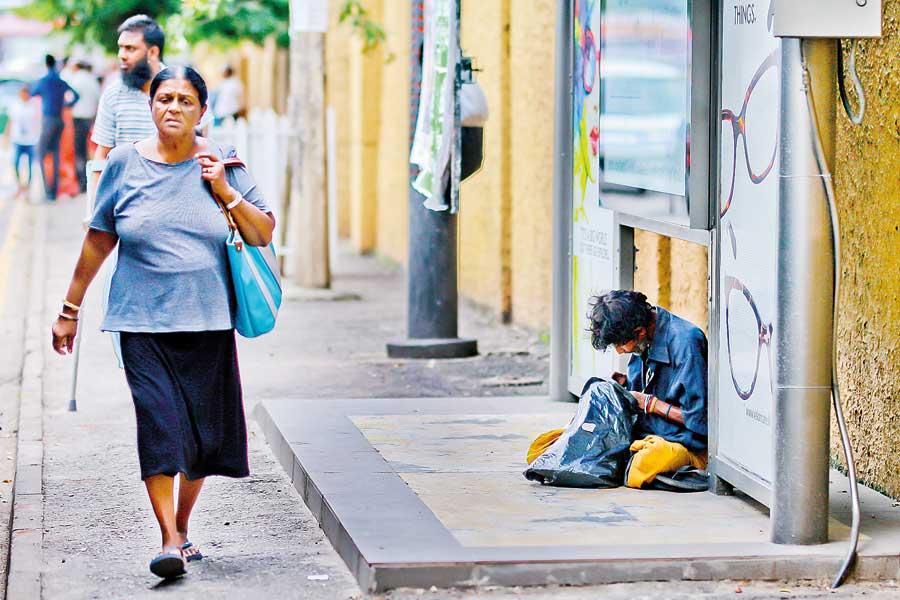
Pics by Damith Wickramasinghe and Samantha Perera
In a statement issued regarding the removal of beggars, former Police media spokesperson, attorney-at-Law SSP Ruwan Gunasekara has denied allegations of the removal of beggars by Police. “There was no order given by the Police Headquarters to other Police stations to remove beggars and send them to a detention Centre in Ridiyagama,” said SSP Gunasekara.
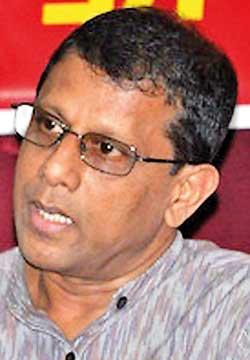 Vagrants Ordinance needs to be abolished: Dr. Kumara
Vagrants Ordinance needs to be abolished: Dr. Kumara“Whether begging has become a social problem depends on how you look at it,” opined social theorist Dr. Kumudu Kusum Kumara. “The idea of begging has been presented as a problem or a social problem and we can, therefore, find a ready-made solution for it. But the idea of a social problem is a misnomer. Social scientists have contributed to the myth of the beggar as a criminal mainly by looking at it as an organised crime by producing spurious data from time to time. Begging is taken up as a 'social problem' for various reasons. One claim is that beggars have to be removed from the city as part of a beautification campaign in order to attract more tourists to the country. Some have suggested making lists of them to begin with. That will be identifying sections of society and removing them which will be a grave injustice to say the least,”said Kumara.
"Begging is taken up as a 'social problem' for various reasons. One claim is that beggars have to be removed from the city as part of a beautification campaign in order to attract more tourists to the country. Some have suggested making lists of them to begin with. That will be identifying sections of society and removing them which will be a grave injustice to say the least"
Dr. Kumara is also of the view that the Vagrants Ordinance needs to be abolished. “The Government should not treat a person as a criminal unless he is proved to be so in a court of law, which beggars are not. I think the Vagrants Ordinance needs to be abolished. Sri Lanka being a Buddhist country we have to look at it from a Buddhist perspective as well. The start of Buddhist tradition indicates mendicants – people begging for religious tradition. If people claim that beggars are part of an organised crime then those criminals should be brought to justice; not those who are being used for it. Being a beggar or a panhandler in the Sri Lankan context also goes in line with homelessness as well. Being homeless is at the core of the social phenomenon called begging. Some take to begging for genuine economic reasons. Some people are compelled to leave their houses. Therefore it is important to show tolerance, empathy and cultivate compassion towards them,” he said.

“Beggars depict a picture of the society,” said attorney-at-Law Sanjaya Wilson Jayasekara. “These people you call ‘beggars’ are those that don’t have adequate housing, food, clothing and jobs. But you don’t see their hidden problems. Many of them are unemployed and in certain cases their children have chased them out of their houses. Elderly people have been forced out of their occupations. Rather than calling them ‘beggars’ I would prefer calling them homeless or unemployed people,” said Jayasekara.
"Many of them are unemployed and in certain cases their children have chased them out of their houses. Elderly people have been forced out of their occupations. Rather than calling them ‘beggars’ I would prefer calling them homeless or unemployed people"
He further said that taking these people away from urban areas shows the negative attitudes towards them by the ruling class. “The ruling class is rich and they want to beautify the city to attract tourists. They have more investments, but what’s the programme they have to take care of these people? The problem of poverty cannot be solved without solving economic inequality. Inequality in Sri Lanka is outrageous. Therefore, taking them away is a violation of their basic rights,” he opined.
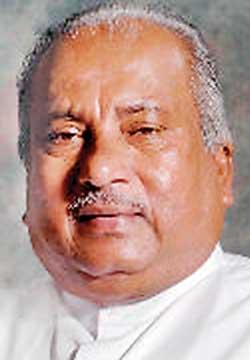 Need to discuss current situation with Social Services Ministry : Lokuge
Need to discuss current situation with Social Services Ministry : Lokuge
In his comments to the Daily Mirror, State Minister of Urban Development Gamini Lokuge said that the Government has to discuss with the Social Service Ministry and study the current situation with regard to beggars. “We will have a plan for them in the future,” he said. When asked about media reports which claimed that beggars in Colombo would be taken away to a detention centre in Ridiyagama, Lokuge refuted claims and said that such a plan still isn’t in effect.
The Daily Mirror also asked a few people as to what they think about the reduction in the number of beggars. Here’s what they had to say:
 Deshan Sangeeth
Deshan Sangeeth
“We don’t know how they would be treated after they are taken away,” said Deshan Sangeeth, a student from Gampaha. I don’t think it would be an issue as long as they are well looked after,” he said.
 Chaminda Ralapanawa
Chaminda Ralapanawa
“There are two sides to it; from one side the city would look cleaner,” opined Chaminda Ralapanawa, a businessman from Kurunegala. “I have visited several countries and have observed that because there are few or no beggars those cities look cleaner. On the other hand if they are being taken away they have to be empowered. We are also aware of the fact that there is a mafia. Hence, the new Government should take measures to empower them rather than let them idle and be jobless for the rest of their lives,” said Ralapanawa.
 Chinthika Prasadi
Chinthika Prasadi
“When we look at it from their side it isn’t the best thing to do,” said Chinthika Prasadi, a nurse from Matara. “It would be better if the Government could help them to be self-sufficient,” she said.
 Chanaka Prasad
Chanaka Prasad
Chanaka Prasad, a university student from Colombo, said that most beggars try to rob from commuters. “They are not actual beggars. Therefore removing them is a good move,” said Prasad.
 Ravindra Kumara
Ravindra Kumara
Ravindra Kumara, an employee from Kandy, is of the view that all beggars should be taken to one place. “That is better than seeing them all over the place. But the Government should have a plan to look after them thereafter,” said Kumara.
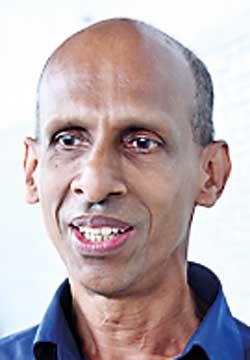 Jagath Suraweera
Jagath Suraweera
“As Buddhists we can’t harm someone from a lower stratum of society,” said Jagath Suraweera, a videographer from Gampaha. “We have to help them. Therefore we have to look at how we should treat them. A city has to be clean, but if a country is developed the wealth needs to be distributed equally. This has to happen at state level and those benefits should be given to these people as well,” said Suraweera.
 K. Priyantha
K. Priyantha
K. Priyantha, an employee from Mawanella, has observed a change in Colombo. “Many people have faced unpleasant encounters with beggars, especially during office hours. Therefore taking them away is a good move,” said Priyantha.
 Dr. Dillina Herath
Dr. Dillina Herath
“From what I have experienced and from my own observations begging has become a very organised business especially on public transport,” said Dr. Dillina Herath, an academic based in Colombo. “Since I don’t drive I use public transport and for ages I have seen the same people boarding buses and trains relating creative stories. Yes some of them are differently-abled, but anyone who can go back and forth in a traveling train or a bus would be able to do a job,” said Dr. Herath.
 Milani Salpitikorala
Milani Salpitikorala
“It should come under the purview of the Ministry of Social Services,” said Milani Salpitikorala, an attorney-at-law based in Colombo. “They need to implement a plan on how to strengthen the families of ‘beggars, so that they don’t need to beg, unless of course it is an organized-begging business,” said Salpitikorala.
 Pasan Nanayakkara
Pasan Nanayakkara
“Most of the beggars are drug addicts or doing it as a business,” opined Pasan Nanayakkara, an employee from Colombo. “It’s a very unpleasant view for a city to have many of these people on the road. It shows that the Government doesn’t care about these people. It also can be a threat to the security of the city. It would be nice to see these people doing some sales or engaging in a useful activity other than begging. There are also people who have their own strengths and weaknesses. If there are programmes to help them out of their current begging routine and get them engaged in a programme which gives them a better quality living, it would be the ideal solution,” said Nanayakkara.
